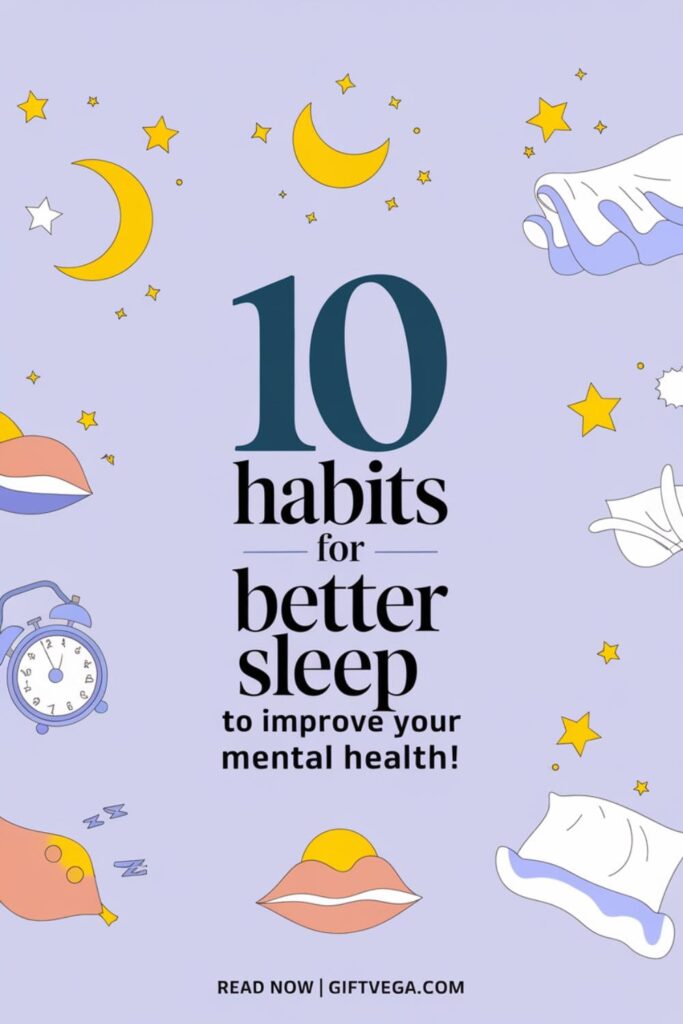Sleep and mental health are deeply related, sharing a complex relationship that affects our daily lives in many ways. The quality of our sleep directly impacts our emotional wellbeing, cognitive function, and overall psychological well-being.
And, poor sleep can always trigger or worsen mental health issues, while good sleep habits can become a powerful tool for maintaining and improving our mental state.
In today’s fast-paced world, where stress and anxiety levels continue to rise because of social media, developing healthy sleep habits has become more important than ever.

Habits for Better Sleep to Improve Your Mental Health
1. Develop a Morning Routine

While much focus is placed on bedtime habits, having a consistent morning routine can be equally important for sleep quality and your mental health.
A well-structured morning routine helps carry your circadian rhythm and sets a positive tone for the day, and this might include exposure to natural light, gentle stretching, or mindful breathing exercises.
2. Practice Sleep Restriction When Needed

Now, for those struggling with insomnia or irregular sleep patterns, sleep restriction therapy can be a powerful tool for resetting sleep patterns and improving mental health.
This involves temporarily limiting time in bed to increase sleep efficiency, gradually expanding sleep time as quality improves. Now, while it might seem counterintuitive, this structured approach can help break the cycle of poor sleep and anxiety about sleep.
3. Practice Temperature Regulation

Your body’s temperature regulation plays a somewhat important role in both sleep quality and mental health, so understanding and managing your body’s temperature throughout the night can significantly improve sleep quality.
This might involve adjusting room temperature, using appropriate bedding layers, or even taking a warm bath before bed to trigger the natural cool-down process that helps you sleep.
4. Use Sound Therapy

The right kind of sound can have a good impact on both sleep quality and mental state. This sound can be white noise, nature sounds, sound therapy can help mask disruptive noises and create an environment conducive to rest.
Different people respond differently to different types of sound, so experimenting with different options can help you find what works best.
5. Incorporate Breathing Exercises

Specific breathing techniques can have a profound impact on both sleep quality and mental state. Practices like 4-7-8 breathing or diaphragmatic breathing can help activate the parasympathetic nervous system, promoting relaxation and better sleep.
These techniques become particularly valuable when dealing with anxiety or racing thoughts at bedtime.
Related: 10 Breathing Exercises to Reduce Stress
6. Monitor Your Sleep Patterns

Analyzing and understanding your personal sleep patterns can provide valuable information into how to improve both your rest and mental health.
Keeping a sleep diary or using sleep tracking devices can help you identify patterns and problems you might not otherwise notice, then this information becomes particularly valuable when working to improve your sleep quality.
7. Practice Gratitude Before Bed

The simple act of reflecting on positive aspects of your life before sleep can have a significant impact on both your sleep quality and mental state.
So, take some time to write down or mentally note things you’re grateful for, this helps shift your mind away from stress and worry towards more positive thoughts.
8. Seek Professional Help When Needed

Sometimes, despite our best efforts, sleep problems persist and continue to affect our mental health, and recognizing when to seek professional help is crucial for maintaining both physical and mental well-being.
Sleep specialists and mental health professionals can provide targeted interventions and support for complex sleep issues. Many people hesitate to seek help, but professional guidance can often provide the best solutions.
9. Monitor Caffeine and Alcohol Consumption

Both caffeine and alcohol can significantly impact sleep quality (in a bad way) and mental health, though many people don’t realize the extent of their effects.
Caffeine can remain in your system for hours after consumption, potentially disrupting sleep even when consumed earlier in the day, alcohol might help you fall asleep initially, but it often leads to disrupted sleep later in the night.
10. Be Mindful of Naps

Those short naps can be refreshing and boost mental performance, but the poorly timed or lengthy naps can interfere with nighttime sleep.
It’s very important to know how to use naps effectively without disrupting your regular sleep pattern. A well-timed 20-30 minute nap in the early afternoon can provide benefits without compromising nighttime rest.
Related: 10 Tips for Helping a Friend with Mental Health Problems!
Conclusion
In conclusion, developing healthy sleep habits is an important component of maintaining good mental health, and these habits work together to create a foundation for better rest and improved psychological well-being.
While implementing these changes might take time and effort, the benefits for both your sleep quality and mental health make it worthwhile.
Remember that everyone’s needs are very different from one another, and it’s important to find the combination of habits that works best for you.
With patience and consistency, these sleep habits can become powerful tools for maintaining and improving your mental health.

Pingback: 10 Great Ways to Identify and Overcome Burnout: Must Know!